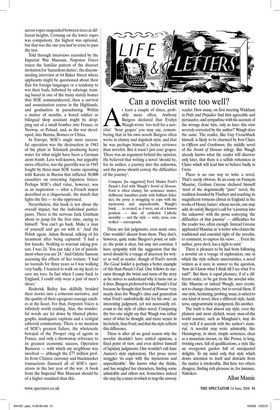Can a novelist write too well?
At least a couple of times, probably more often, Anthony Burgess declared that Evelyn Waugh wrote ‘too well for a novelist’. ‘Sour grapes’ you may say, remembering that in his own novels Burgess often wrote in clumsy and slapdash style, and that he was perhaps himself a better reviewer than novelist. But it wasn’t just sour grapes. There was an argument behind the opinion. He believed that writing a novel ‘should be, for its author, a journey into the unknown, and the prose should convey the difficulties of the journey’.
Compare [he suggested] Ford Madox Ford’s Parade’s End with Waugh’s Sword of Honour. Ford is often clumsy; his sentences stutter; deliberate banalities jostle with brilliant felicities; the prose is struggling to cope with the mysterious and unpredictable. Waugh’s book . . . is created, as it were, out of a known position — that of orthodox Catholic morality — and the style — witty, terse, controlled — corresponds.
These are fair judgments, even acute ones. One wouldn’t dissent from them. They don’t, however, quite make Burgess’s point; or rather, the point is clear, but may not convince. I have sympathy with the suggestion that the novel should be a voyage of discovery for writer as well as reader, though of Ford’s novels The Good Soldier is perhaps a better example of this than Parade’s End. One follows its narrator through the twists and turns of the story as he strives to understand why it turns out as it does. Burgess preferred to take Parade’s End because he thought that Sword of Honour ‘very nearly does for Waugh’s class and generation what Ford’s undoubtedly did for his own’; an interesting judgment, yet not necessarily relevant to the style of either novel. Comparing the two one might say that Waugh was rather surer of what he thought, and more secure in his beliefs, than Ford; and that the style reflects this difference.
There is after all no good reason why the novelist shouldn’t have settled opinions, a fixed point of view, and even deliver himself of lapidary judgments. One wouldn’t call Jane Austen’s style exploratory. Her prose never struggles ‘to cope with the mysterious and unpredictable’. She knows what she thinks, and has weighed her characters, finding some admirable and others not. Sometimes indeed she may lay a snare in which to trap the unwary reader. How many, on first meeting Wickham in Pride and Prejudice find him agreeable and persuasive, and sympathise with his account of the wrongs done him, only to have this view severely corrected by the author? Waugh does the same. The reader, like Guy Crouchback himself, is likely to be charmed by Ivor Claire in Officers and Gentlemen, the middle novel of the Sword of Honour trilogy. But Waugh already knows what the reader will discover only later, that there is a selfish rottenness in Claire which will lead him to behave badly in Crete.
There is no one way to write a novel. That’s surely obvious. In an essay on François Mauriac, Graham Greene declared himself ‘tired of the dogmatically “pure” novel, the tradition founded by Flaubert and reaching its magnificent tortuous climax in England in the works of Henry James’, whose novels, one may add, do satisfy Burgess’s call for ‘a journey into the unknown’ with the prose conveying ‘the difficulties of that journey’ — difficulties for the reader too, often enough. Instead Greene applauded Mauriac as ‘a writer who claims the traditional and essential right of the novelist, to comment, to express his views . . . Even the author, poor devil, has a right to exist.’ There is pleasure to be had from following a novelist on a voyage of exploration, one in which the style reflects uncertainties, a novel written as it were in answer to the question, ‘how do I know what I think till I see what I’ve said?’. But there is equal pleasure, if of a different order, to be got from the novelist who, like Mauriac or indeed Waugh, uses events, not to change characters, but to reveal them. If one style, hesitating, probing, mazy, is suited to one kind of novel, then a different style, lucid, terse, epigrammatic in judgment, fits another.
The truth is that almost any style, even the plainest and most clichéd, weary man-of-the world manner, such as Maugham’s, may do very well if it accords with the author’s material. A novelist may write admirably, like Hemingway, in short, simple sentences, clear as a mountain stream, or, like Proust, in long, twisting ones, full of qualifications, a style like an overgrown garden full of unexpected delights. To my mind only that style which draws attention to itself and distracts from the matter is intolerable. But here too others disagree, finding rich pleasure in, for instance, Nabokov.
Allan Massie


















































































 Previous page
Previous page